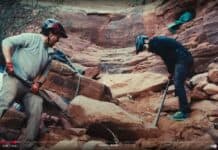
Knitting Without Borders is the latest to anthropomorphize the usually carnivorous quadrupeds, to the delight of children and adult recipients alike.
However, unlike other teddy bears, these bears are not shot out from a factory and slapped with a corporate logo.
Individually knit or crocheted with good ol’ fashioned love, each bear has a unique feature — whether it be bright color combinations or accessories like strapping suspenders or long yarn braids.
Gloria Brown became the Knitting Without Borders coordinator for Arizona when she moved to Village of Oak Creek from New Jersey last summer. She meets people from the Sedona, Village of Oak Creek and Prescott chapters of the program to pick up the bears for delivery.
Brown originally found out about the national organization, which sends the bears to needy areas locally as well around the world, from her N.J. synagogue.
“I fell in love with it and haven’t stopped since,” Brown said. “And that was many years ago.”
Brown’s nursing background and work surveying Medicaid patients led her to connections with hospitals and group homes, where she noticed the needs were larger than purely medicinal.
In a group home for patients with severe cerebral palsy, Brown recalled how “a lot of them were being fed with tube feedings, so they’d be in a wheelchair leaning back with an IV pole holding their food, and so I’d hang the bear through there.”
Besides hospitals, the bears have gone to domestic violence shelters, courthouses, places hit hard with natural disasters and areas where the bear might be the only new toy a child receives in a year.
As a social action co-chairwoman at the Jewish Community of Sedona and the Verde Valley, Brown has been able to get many at the center involved, and before COVID-19 hit, Brown and other volunteers were able to make and donate bears to North Country Health Care and Healthy Families Arizona, to name a few.
After COVID hit, many health centers became closed to visitors and any non-essential donations. Brown had a bear collection basket at Sedona Knit Wits and was trying to donate bears to go along with store owner Linda Kimberly’s fundraising for the University of Arizona Steele Children’s Research Center, but was told the center was not able to receive the bears.
“The children are so immune-compromised with the research on cancer and various other situations [there] that they said, ‘You know, we can’t take them because they’re not sterilized.’” Brown recalled.

The bears are made with all their features sewed on, so they can go through the washer and dryer, but with health precautions at an all-time high, some are not taking any chances.
Wanting to give the bears to others in need, Brown decided to look closer to home.
“I’m familiar with poverty, but the poverty in Northern Arizona is just totally overwhelming to me … to my comprehension,” Brown said. “Because I thought I understood poverty, and obviously during Medicaid visits [in the Newark, N.J. area] I know poverty, but not like here. It’s really something else up here.”
Brown connected with Carrie Dallas, project coordinator for Native Americans for Community Action in Flagstaff, and asked if NACA had a need for the bears. Dallas runs the Lasting Indigenous Family Enrichment program, which supports tribal practice activities and events, with a focus on building resiliency and connection between community, family and culture, as well as promoting healthy lifestyle to reduce chronic disease risk factors, according to nacainc.org.
“My program is intergenerational and inspiring, motivating, encouraging, caring and nurturing … and so when I saw the bears I was just like … would/could our program use it? And my personal preference was ‘absolutely,’” Dallas said.
Hundreds of Brown’s Knitting Without Borders bears will eventually migrate to some of the 21 different Indigenous nations around Arizona.
“It’s personal because my mom collected bears and you should have seen her house,” Dallas laughed. “[It] was full of bears to the point where I would go in there and say, ‘Mom, this is crazy!’ and she said ‘No, they each have their own spirit, they’re my friends, they’re my children.’ And so I knew what it did for my mother and so I just took that love from that experience and wanted to connect and I just thought, ‘We’ll see how it goes.’”
Dallas said she knows the bears will help those on the reservations, many of which were hit extra hard with COVID-19.
“I recently heard a story of a family with COVID … the family all contracted it. A child was left in a room — 11 years old and isolated. If she had a bear to hold onto [that would have been a blessing]. People are in need of something to care for and love.”
Brown and Dallas hope to host an event in the spring where Brown can come and help tell the story of where the bears came from and pass them out.
“I remember as a child growing up in Tuba City, I don’t know what organization would come but they would come to Tuba City every Christmas and they’d bring a big truck [with Santa.],” Dallas said. “And we often would get one gift, and I remember getting a giraffe made out of material and it was so cool …. We didn’t know if it was store bought or what; we didn’t know the difference. It was a toy and to get a giraffe — something that’s not on the reservation, an animal — you know, is just special.
“And so I feel like … receiving gifts is just wonderful, and anything tangible that people can touch.… We talk about being humans and as a human we have senses. So we have our sight, our touch, and when you can touch something, and you see how special it is and you hear why it was made you can’t help but have some sort of great feeling to lift you up.”
“Everybody has some point in their life where they just need an extra hug,” Brown added.
Brown also plans to make bears for Hope House of Sedona, a new West Sedona homeless shelter that will be opening up next spring.
“People don’t realize that there’s poverty in Sedona … it’s just not obvious.”
Brown said making the bears with the other volunteers is therapy for them just as much as for the person who receives them.
It’s hard to stop knitting a bear once you’ve started, Brown said, adding that she can now knit a bear’s base in just a few hours.
For more information on how to volunteer with the Sedona chapter of Knitting Without Borders, email Brown at knittingwithout bordersarizona@gmail.com.




















